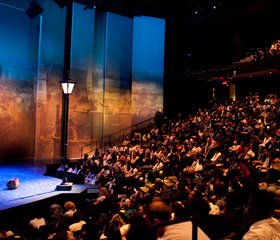On a cold, sunny afternoon this past week, hundreds of New York City high school students milled around the plaza in front of Lincoln Center Theater. They were awaiting a special student performance of My Fair Lady, and the scene was lively. Spirited conversations, impromptu moves to music playing through headphones, and back-and-forth banter with adult supervisors were everywhere. A succession of selfies took place around the plaza’s pool, with kids vying to see who could strike the most memorable pose.
In other words, a sense of expectation hung in the air. All pre-show audiences have this to some degree: after all, what’s the point of going to see something without that sense of expectation – that once the curtain goes up you will be informed or entertained or moved? But youth means physical energy and so physical energy there was on that plaza.
At student matinees there is often another kind of expectation – the feeling that students will be so boisterous as to throw off the performers or to distract more sedate members of the audience. As to the first feeling: most actors I know look forward to the student houses. Student responsiveness may initially affect the practiced pace of a scene but it reminds the performers that theater is a live art – not a monologue by actors but an ever-shifting conversation between those on stage and those in the seats.
As to the second feeling, that youthful audiences can be overly distracting, my experience is that if they are engaged by the performance they are every bit as attentive as an older adult crowd. In fact, the idea that students are inherently fidgety has always struck me as condescending. This week’s matinee offered proof of my observations. The students were with the performance from the beginning. They granted Kerstin Anderson, as Eliza, initial applause, and audibly oohed when she entered wearing her ball gown. Otherwise, they were calm. So quiet, in fact, that some of actors at intermission told me they were afraid that the kids were not engaged.
They were soon disabused of that notion, in act two. They awarded “Get Me To The Church On Time” truly thunderous applause. And they became increasingly disapproving of Higgins’ attempts to assert his misogyny at the expense of Eliza.
As one female student said to me as the curtain came down: “I’d like to see Higgins try his teaching methods at my school. He wouldn’t last a day!”
Brendan Lemon is the editor of lemonwade.com
